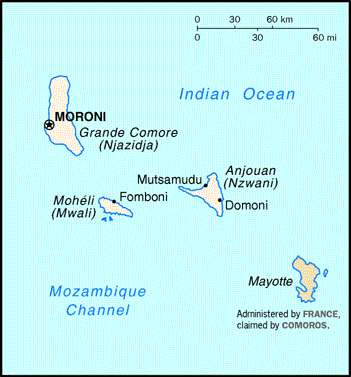Federal Islamic Republic of the Comoros
POPULATION: 752,400 (2014)
AREA: 838 sq. mi. (2,170 sq. km)
LANGUAGES: French, Arabic (official); Comoran (a Swahili dialect)
NATIONAL CURRENCY: Comorian franc
PRINCIPAL RELIGIONS: Sunni Muslim 86%, Roman Catholic 14%
ISLANDS: Grand Comore (Ngazidja), Anjouan (Nzwani), Moheli (Mwali), Mayotte (Maore); Capital: Moroni, 30,000 (1999 est.)
ANNUAL RAINFALL: Varies from 43–114 in. (1,100–2,900 mm)
ECONOMY: GDP $647.7 million (2014)
PRINCIPAL PRODUCTS AND EXPORTS: Agricultural: vanilla, cloves, perfume oils, copra, coconuts, cinnamon Manufacturing: perfume distillation, textiles, jewelry, construction materials Tourism is also an important industry.
GOVERNMENT: Independence from France, 1975. President elected by universal suffrage. Governing bodies: Assemblee Federale elected by universal suffrage.
HEADS OF STATE SINCE 1990:
- 1990–1995 President Said Mohamed Djohar
- 1996–1998 President Mohamed Taki Abdulkarim
- 1998 President Tadjiddne Ben Said Massounde (interim)
- 1999– Colonel Azali Assoumani
ARMED FORCES: 520 (1996 est.), serving under approximately 20 French officers.
EDUCATION: Compulsory for ages 7–15; literacy rate 57%

The Comoros are a group of four islands lying in the Indian Ocean between MOZAMBIQUE and MADAGASCAR. Mayotte, the easternmost island, is an administrative territory of France. The other three—Grande Comore (Ngazidja), Anjouan (Nzwani), and Moheli (Mwali)—make up the Federal Islamic Republic of the Comoro Islands.
All the islands are volcanic in origin. Mayotte, the oldest, is fairly flat; the other islands are mountainous. Rising to 7,790 feet, Mount Karthala is the highest peak on the islands and an active volcano. The Comoros enjoy a tropical climate, featuring a wet season from October to April and a dry season from May to September. The temperature averages around 66°F during the dry season and between 75°F and 79°F in the rainy season.
The islands' fertile volcanic soil and mild climate provide favorable conditions for agriculture. Most of the inhabitants depend on local farming, raising livestock, and fishing for a living. However, the population has increased so much over the last 50 years that there is some question about the continuing ability of the Comorians to feed themselves. In addition, crops grown for export are producing less income because of reduced demand for the islands' main agricultural products—vanilla, cloves, and perfume oils.
In recent years, the islands have made a major effort to build up the tourist industry. With their beautiful beaches, coral reefs, and warm climate, the Comoros have long attracted visitors. Tourism provides an opportunity for economic growth in the near future.
The Comoros have been inhabited for over a thousand years, but during most of that time each island was separate, ruled by its own sultan or sultans. As a result, the islands developed independent traditions and dialects of the language known as Swahili. Even today inhabitants of the various islands have difficulty understanding one another.
For hundreds of years the Comoros prospered as Indian Ocean winds brought sailing ships engaged in trade between Asia and Africa to the islands. This trading activity resulted in a very diverse population made up of Africans, Arabs, Indians, Europeans, and Malagasy (peoples from Madagascar). The invention of the steamship put an end to this era, and the islands eventually became dependent upon the French.
France gained control of the Comoros in the late-1800s and in 1912 placed them under the authority of its colony of Madagascar. The islands continued to be attached to French Madagascar until the end of World War II. Three of them gained independence in 1975, but the inhabitants of Mayotte chose to remain under French control.
Since independence, the government has been toppled several times by coups backed by foreign mercenaries. Twice the French have stepped in. The country became the Federal Islamic Republic of the Comoro Islands (FIRCI) in 1978 with Ahmed Abdallah as president. An attempt by the island of Anjouan to secede from the republic led to another coup in 1999 and to military rule under Colonel Azali Assoumani. The island of Mayotte is still claimed by FIRCI, but it remains a territory of France. (See also Colonialism in Africa, Government and Political Systems, Islam in Africa.)